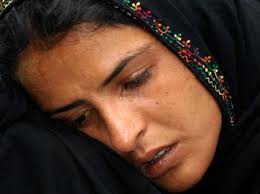
Mukhtar Mai was sentenced by a local Pakistani council to be gang-raped. At the risk of her life, she fought back and established the truth.
(Continued from Part 1.)
When President Hamid Karzai goes to appoint members to the country’s human rights commission, he appoints “unqualified new commissioners, including a former Taliban government official who urged repeal of EVAW. A committee including representatives of key government institutions prepared a draft law that would have reinstated stoning as a punishment for adultery. (1)
In Afghanistan, local government in the form of a loya jirga or in Pakistan, local government in the form of a panchayat can sentence a woman to be raped. Mukhtar Mai was the victim of such a travesty of justice.
Mukhtar was sentenced by a local panchayat to be gang-raped for a crime she did not commit. She refused to be silenced and some of her rapists were brought to trial, only to be subsequently released. Her frustrated wait for justice is fairly typical.
“On March 15, four of the five men convicted in the Mukhtar Mai rape case, but later acquitted by the Multan bench of the Lahore High Court, were released by Central jail authorities only to be re-arrested on March 18 on the intervention of Prime Minister Shaukat Aziz. Meanwhile, nearly three years after she was raped by four ‘volunteers’ on the order of a village panchayat, Mukhtar Mai still awaits justice.” (2)
In 2005, the head of the Pakistani government, General Pervez Musharaf, publicly dismissed women’s allegations of rape:
“In fall 2005 General Musharaf of Pakistan spoke dismissively of the claims of Pakistani women, saying that many of them make false or exaggerated claims of rape in order to get financial support and visas from foreigners. He likened rape to a ‘money-making thing’: if you want to go abroad.
“He did so despite the publicity surrounding Mukhtar Mai who was raped – an act of honor revenge – at the orders of a village jurga in 2002; and despite the threats against Shazia Khalid’s life after she went public about her rape. Pakistani feminists were outraged and demonstrated in the street to make their counter-statement. (3)
This situation is not one that happens only in Afghanistan and Pakistan. It is common in many parts of the globe.
“Over half a million girls and women were raped in the 1994 Rwandan genocide. Tens of thousands of girls and women have been raped in Bosnia, Sierra Leone and East Timor.” (4)
We could add most African subsaharan countries to the list, much of South and Southeast Asia, and the list could go on.
Finally, a woman’s rape is looked upon as having shamed her and her family. Raped women are often not permitted to rejoin their families. It’s often hoped that they’ll commit suicide and save the family embarrassment.
“In many of these countries, as in Serbia and Pakistan, a raped woman will be shunned by her community, and suicide is often thought to be her only avenue of escape. Despite this stigma and shaming, in Sierra Leone the scale of war rape was so massive that rape survivors were welcomed back into their communities despite all else.” (5)
“Despite all else.”
How are we to penetrate the darkness and relieve the pressure of such an ingrained, persecutory way of life in so many parts of the world?
This is just a look into one area of life that women face. In many areas of the world, a woman’s life is fraught with peril at every turn and state protection (police, judges and prison officials) is either virtually useless or else part of the net of persecution.
Such is the darkness left on the planet today and we lightworkers are tasked with reclaiming and restoring life for both victim and perpetrator.
Footnotes
(1) Heather Barr, “Women’s Rights in Afghanistan Must be Steadfastly Respected,” March 20, 2014, at https://www.hrw.org/news/2014/03/20/womens-rights-afghanistan-must-be-steadfastly-respected.
(2) Ali Dyan Hussan, “The Jurisdiction Dilemma,” HRW, Mar, 22, 2005, at https://www.hrw.org/news/2005/03/20/jurisdiction-dilemma.
(3) Zillah Eisenstein, Sexual Decoys: Gender, Race and War in Imperial Democracy. London: Zed Books, 2007, 29, at https://books.google.ca/books?id=c22VbFCdcdMC&pg=PA29&lpg=PA29&dq=jurga+rape&source=bl&ots=IpqZVw9Uw9&sig=1vPHrdJYp9iKshYgFVeUJScsauY&hl=en&sa=X&ei=W6PaU6KcDqGO8gHO0oCYCw&ved=0CEMQ6AEwBg#v=onepage&q&f=false.
(4) Loc. cit.
(5) Loc. cit.

